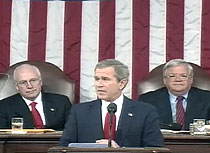2007年VOA标准英语-US President's State of the Union Address Is St
时间:2019-01-13 作者:英语课 分类:2007年VOA标准英语(一月)
Washington, DC
22 January 2007
watch State of Union report

President Bush delivering his State of the Union Address in 2006
President Bush will deliver his State of the Union Address on Tuesday before both houses of Congress, members of the Supreme 1 Court, his Cabinet, other senior government officials and the American people. Jim Bertel looks at the history and significance of this political custom, which goes back to the founding of the American republic.
President Bush's address to both houses of Congress continues a long-standing tradition of communication between the executive and legislative 2 branches of the United States government.
Under the U.S. Constitution, an American president must report to Congress on the state of the nation, his policy plans and on any other issues he considers necessary and expedient 3. The Constitution gives no further guidance, but the presidential message, now commonly called the State of the Union Address, has become an annual political ritual.
The tradition began with the first president, George Washington, who delivered his yearly messages in person. Delivery in person fell out of favor, though, under third president Thomas Jefferson. American University professor Allan Lichtman explains that Mr. Jefferson felt appearing before Congress made a president seem too much like royalty 4.
"So Jefferson, in 1801, decided 5 he would not appear personally before Congress, but rather he would deliver a written annual message. And, lo and behold 6, we changed the precedent 7. Since Jefferson, presidents kept delivering annual messages, but in writing rather than in person, until another great political leader came on the scene -- Woodrow Wilson."
President Wilson went before Congress in 1913 to deliver his proposal for economic regulation. The next president to appear in person was Franklin D. Roosevelt, whose annual speech was the first to be broadcast on radio: "Mr. Speaker, members of the Senate and the House of Representatives..."
Stephen Wayne is an expert on the presidency 8 at Georgetown University in Washington. "The State of the Union address has become the way in which the president sets the agenda for Congress and speaks to the American people about his accomplishments 9 and hopes for the future,” says Wayne. “It's part of our political tradition. There is a lot of ceremony attached to it, and that usually works to the benefit of the president."
Abraham Lincoln, in fact, used the annual message in 1862 to launch his first attack on slavery, saying that without slavery there would have been no U.S. Civil War. Franklin D. Roosevelt announced his "economic bill of rights" in one of his addresses. Harry 10 Truman went before Congress to outline the program he called "the Fair Deal." And Lyndon Johnson in the 1960s proposed new civil-rights laws and efforts to eradicate 11 poverty: "And this administration, today, here and now, declares unconditional 12 war on poverty in America."
This year, President Bush will try to reinvigorate his second-term agenda following a difficult 2006, in which voters swept out Republican office-holders and put opposition 13 Democrats 14 in control of both houses of Congress. Experts from both parties say November's elections amounted to a referendum on Mr. Bush's Iraq policies.
- It was the supreme moment in his life.那是他一生中最重要的时刻。
- He handed up the indictment to the supreme court.他把起诉书送交最高法院。
- Congress is the legislative branch of the U.S. government.国会是美国政府的立法部门。
- Today's hearing was just the first step in the legislative process.今天的听证会只是展开立法程序的第一步。
- The government found it expedient to relax censorship a little.政府发现略微放宽审查是可取的。
- Every kind of expedient was devised by our friends.我们的朋友想出了各种各样的应急办法。
- She claims to be descended from royalty.她声称她是皇室后裔。
- I waited on tables,and even catered to royalty at the Royal Albert Hall.我做过服务生, 甚至在皇家阿伯特大厅侍奉过皇室的人。
- This gave them a decided advantage over their opponents.这使他们比对手具有明显的优势。
- There is a decided difference between British and Chinese way of greeting.英国人和中国人打招呼的方式有很明显的区别。
- The industry of these little ants is wonderful to behold.这些小蚂蚁辛勤劳动的样子看上去真令人惊叹。
- The sunrise at the seaside was quite a sight to behold.海滨日出真是个奇景。
- Is there a precedent for what you want me to do?你要我做的事有前例可援吗?
- This is a wonderful achievement without precedent in Chinese history.这是中国历史上亘古未有的奇绩。
- Roosevelt was elected four times to the presidency of the United States.罗斯福连续当选四届美国总统。
- Two candidates are emerging as contestants for the presidency.两位候选人最终成为总统职位竞争者。
- It was one of the President's greatest accomplishments. 那是总统最伟大的成就之一。
- Among her accomplishments were sewing,cooking,playing the piano and dancing. 她的才能包括缝纫、烹调、弹钢琴和跳舞。 来自《现代英汉综合大词典》
- Today,people feel more hurried and harried.今天,人们感到更加忙碌和苦恼。
- Obama harried business by Healthcare Reform plan.奥巴马用医改掠夺了商界。
- These insects are very difficult to eradicate.这些昆虫很难根除。
- They are already battling to eradicate illnesses such as malaria and tetanus.他们已经在努力消灭疟疾、破伤风等疾病。
- The victorious army demanded unconditional surrender.胜方要求敌人无条件投降。
- My love for all my children is unconditional.我对自己所有孩子的爱都是无条件的。
- The party leader is facing opposition in his own backyard.该党领袖在自己的党內遇到了反对。
- The police tried to break down the prisoner's opposition.警察设法制住了那个囚犯的反抗。